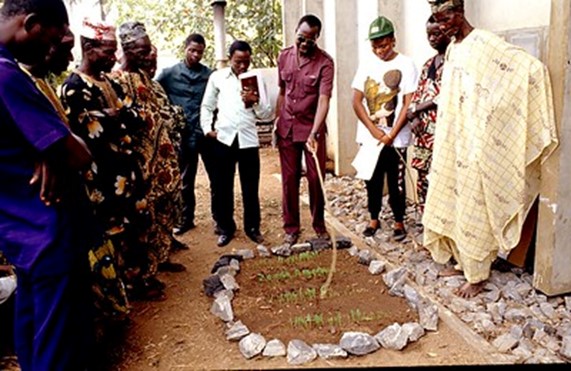Accelerating Agricultural Transformation and Development in Africa: Building a Pipeline of Skilled Value Chain Actors
By Layih Butake
10/22/2021
Photo by IITA/ Farmers in a training session during Farmers' Field Day in IITA Ibadan, Nigeria.
The journey to achieving “The Africa We Want” circa 2063 is fraught with history, opportunities, but perhaps most importantly, lessons. As the continent stays the course to prosperity towards a sustainable transformation of our world, there is a dire need for actors across the board to analyse and revisit relevant policies to better leverage opportunities to leapfrog the anticipated horizon of self-sufficiency. “Skills Development for Value Chain Actors in African Agriculture” by Oliver Kirui, published in the Regional Strategic Analysis and Knowledge Support System (ReSAKSS) 2020 Annual Trends and Outlook Report Sustaining Africa’s Agrifood System Transformation: The Role of Public Policies (Resnick et al. 2020) apprehends policies and interventions related to skills development and training for agricultural and food value chain development in Africa. The report asserts that skilling up value chain actors will transform them into skilled entrepreneurs who run their farms or businesses as productive and sustainable economic enterprises (Kirui 2020). Published by the International Food Policy Research Institute (IFPRI) and AKADEMIYA2063, the research reinforces an incontrovertible fact – agricultural innovation is a viable pathway to the knowledge-led development of Africa.
Why Africa must invest in Training Value Chain Actors
Sustainable Development Goal (SDG) 8, promoting inclusive, sustainable economic growth and decent work for all, and Agenda 2063 Goals 4, transformed economies and 5, modern agriculture for increased productivity and production, establish the correlation between skills development and economic growth. While agriculture and rural development are key priority areas for the African Union, with member states being encouraged to provide training opportunities, Agricultural Technical Vocational Education and Training (ATVET), albeit provided through university-based certifications and private institutions, is inadequate in the public sector across Africa. The Technical and Vocational Education and Training (TVET) is insufficient, and existing training institutes have been neglected and often poorly equipped. Factoring in unemployment rates, idle (unskilled) youths, and the mismatch between available skills and labour market needs, there is a strong case to be made for developing value chain actors’ skills to increase the incomes and livelihoods of the poor, towards inclusive economic growth.
Lessons from the CAADP ATVET Initiative
Designed to incorporate ATVET components into national education systems, CAADP ATVET is responding to Africa's need for trained and qualified smallholder farmers. Piloted in Benin, Burkina Faso, Ghana, Kenya, Malawi and Togo, CAADP ATVET is providing support to partner countries in knowledge management and best practices, hosting African Union promotion programs, and the development and implementation of pilot qualification measures for value chain actors. Notwithstanding challenges in coordination, meaningful reform and inadequacy of training programs, the successful first phase was expanded to Namibia, Rwanda, Sierra Leone, South Africa, Tunisia, and Uganda in 2017.
Towards a Dual System of Skills Development in African Agriculture
Transformation of food systems will require a holistic approach to skills development, driven by calibrated, institutional infrastructure to drive mainstreaming and upgrading across key agri-food value chain segments, as opposed to disjointed interventions. Capturing lessons learned, adapting policy frameworks to relevant contexts, and merging education with experiential learning for optimal skill building is the logical next step for the optimisation of ATVET. The German dual system has been referenced as a robust model which can be adapted for a reinforced ATVET system for sustainable agricultural transformation.
Layih Butake is the Director of Communication and Outreach at AKADEMIYA2063.
